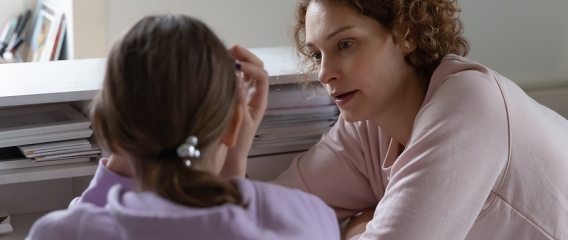How to Talk to Children About Divorce
According to a study published by the Center for Law and Social Policy, 53% of divorcing couples have at least one child. As a result of divorce, about 11 million American children live in a home with only one parent.
When parents divorce, one of their main concerns is often the wellbeing of their children. Divorce can affect a child’s education, emotional and behavioral growth, and physical health.
Your approach to divorce can dispel some of their concerns and allow them to approach the divorce with a healthier attitude. Here are some tips for talking to children about divorce:
Reassure Them
With children of any age, reassure them that you and your former spouse will take care of them. Keep in mind that your children are highly dependent on you and they will have concerns about their own needs. Make sure that they understand that you and your ex-spouse will remain in their lives and that they will have the food, shelter, and attention they have always received.
Adjust Your Approach According to Their Ages
At different developmental stages, children will interpret your divorce differently. By adjusting your approach based on each child’s age, you can explain the divorce in terms they understand.
Preschoolers
Preschool-age children have a limited ability to understand that other people have feelings and experiences that are independent of their own. As a result, they see themselves at the center of their world.
Children of this age will probably see divorce as something happening to them rather than something that affects them. They will think that “dad left me,” rather than “dad moved out.” In explaining divorce, make sure that your children know that the decision was made by and for you and your former partner.
Grade-School Children
Older children have a greater understanding of individual agency. This is a double-edged sword because they use this understanding to place blame. Thus, if mom and dad decided to divorce, they feel like they are to blame for the way that the divorce affected them.
When talking to children in grade school, try to dispel any blame. If you approach it with phrases like, “This is your mom’s fault” or “This is my fault,” you might spark a flame that the child will carry for the rest of their life.
Older Children
Teenagers have a greater understanding that things do not always work out. They will probably understand the issues that led to your divorce.
Teenagers also have a greater expectation for communication from you and your spouse. Keeping things from them could lead to resentment. To avoid this problem, keep lines of communication open.
Watch for Problems
Do not let problems fester. If your child acts out or exhibits changes in mood or behavior, talk to them. Answer their questions and encourage them to express themselves. If the problems persist or worsen, seek help from a counselor.
Provide a Roadmap
Although every divorce is different, talk to a lawyer about the process and explain that process to your children. Uncharted waters can provoke anxiety in children. By knowing what will happen in the proceeding, children can prepare mentally for the divorce.
Divorce can be complex, but the team at Gucciardo Family Law is here to help. To discuss your divorce case and the ways that it might affect your legal relationship with your children, contact us for a free initial consultation.
Too much information?
We focus exclusively on family law matters so we are always available to answer your questions and help.


















Leave a Reply